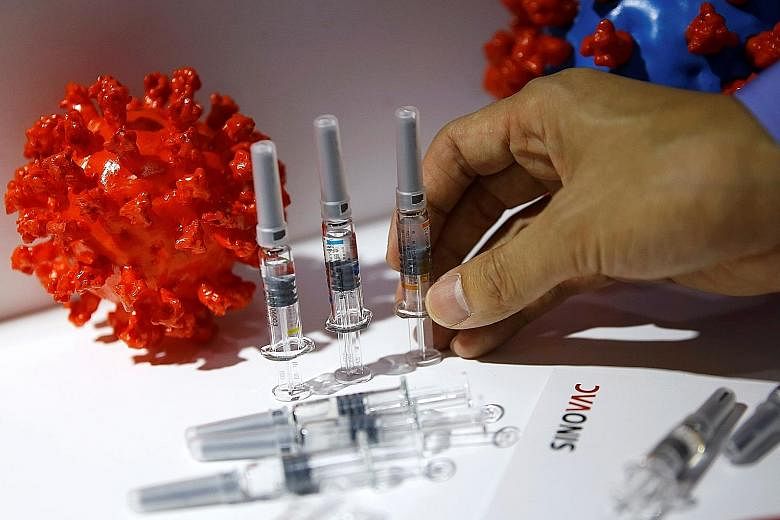GENEVA • The World Health Organisation (WHO) says it does not expect widespread immunisation against the coronavirus until the middle of next year, tempering hopes just as research revealed encouraging early results from a Russian vaccine.
The virus, which has killed about 880,000 people worldwide, continues to spread, with Italy's flamboyant former prime minister Silvio Berlusconi becoming the latest high-profile figure to test positive.
Across the world, governments are hoping to announce a vaccine as soon as possible against the virus, which has infected more than 26 million people, upended millions of lives and wreaked havoc on the global economy.
The United Nations health agency welcomed the fact that a "considerable number" of vaccine candidates have entered final-stage trials, but "in terms of realistic timelines, we are really not expecting to see widespread vaccination until the middle of next year", WHO spokesman Margaret Harris said on Friday.
WHO chief Tedros Adhanom Ghebreyesus said the agency would not endorse a Covid-19 vaccine if it is not safe and effective.
Russia has already approved a vaccine, and research published in The Lancet medical journal on Friday said patients involved in early tests developed antibodies with "no serious adverse events".
But scientists warned that the trials were too small - just 76 participants - to prove safety and effectiveness.
Washington has also urged US states to get ready for a potential vaccine roll-out by Nov 1, sparking concerns that President Donald Trump's administration is rushing to start distributing a vaccine before the Nov 3 election.
There has been massive pressure to roll out a vaccine quickly as the pandemic continues to take its toll.
On Friday, Dr Tedros said "vaccine nationalism" would only slow the effort to quash the pandemic and called for vaccines to be used fairly and effectively.
He said 78 high-income countries have now joined the Covax global vaccine allocation plan, bringing the total to 170 countries, and the "number is growing".
He urged others to join by the Sept 18 deadline for binding commitments.
Joining the plan guarantees those countries access to the world's largest portfolio of vaccines, with nine candidates now in the pipeline, he said, adding that a further four were "promising".
WHO chief scientist Soumya Swaminathan called it an "optimistic scenario" since the typical success rate of 10 per cent could see several vaccines approved.
The WHO and the Global Alliance for Vaccines and Immunisation vaccine alliance are leading the Covax Facility, aimed at helping to buy and distribute vaccination shots fairly around the world.
But some countries that have secured their own supplies through bilateral deals, including the US, have said they will not join Covax.
"Vaccine nationalism will prolong the pandemic, not shorten it," Dr Tedros said. "If and when we have an effective vaccine, we must also use it effectively... The first priority must be to vaccinate some people in all countries, rather than all people in some countries."
He added that priority should be given to healthcare workers, the elderly and those with underlying conditions.
Dr Tedros thanked Germany, Japan, Norway and the European Commission for joining Covax in recent days.
AGENCE FRANCE-PRESSE, REUTERS



